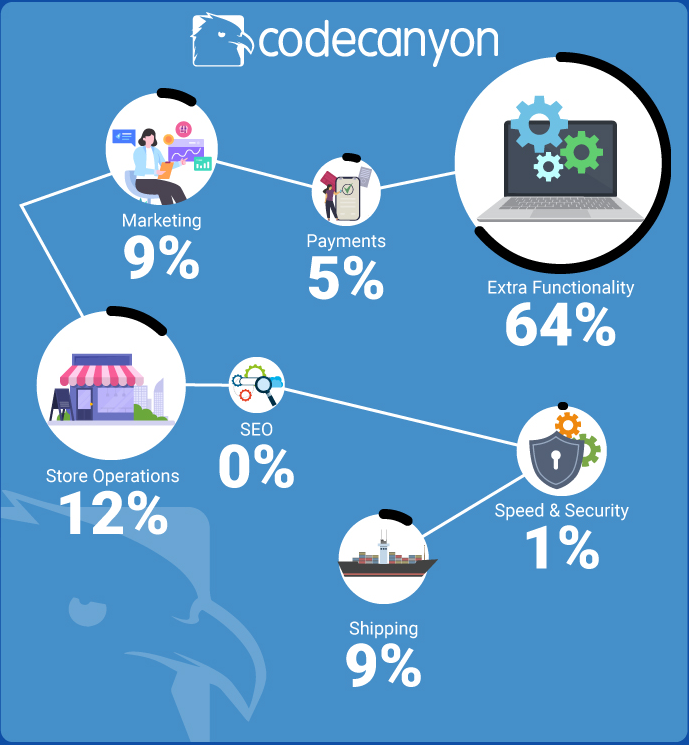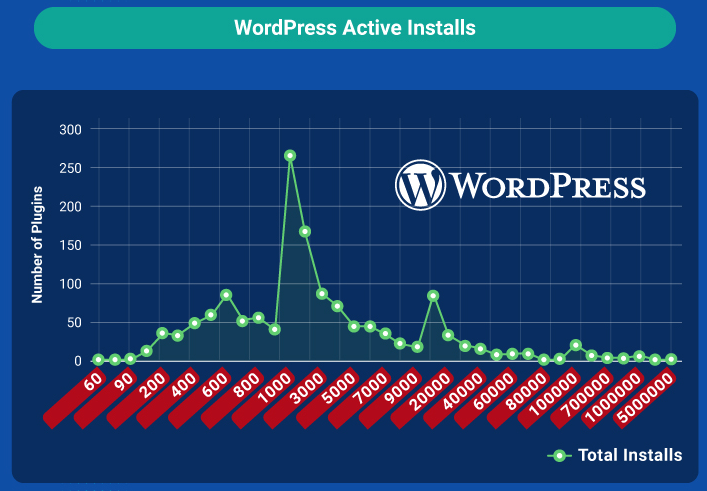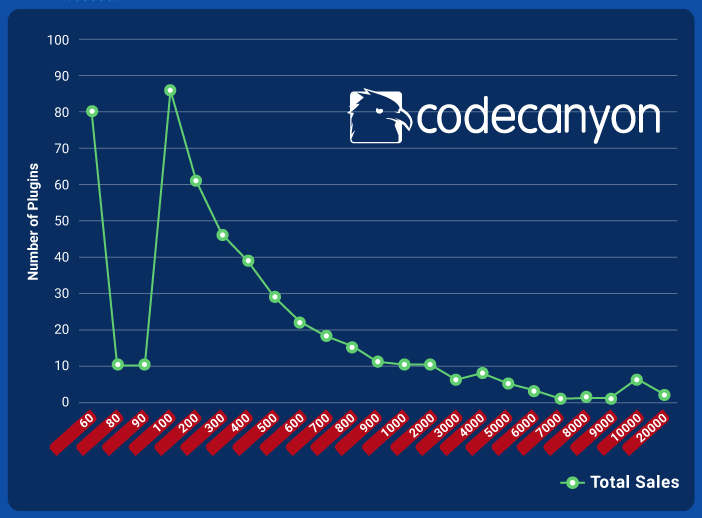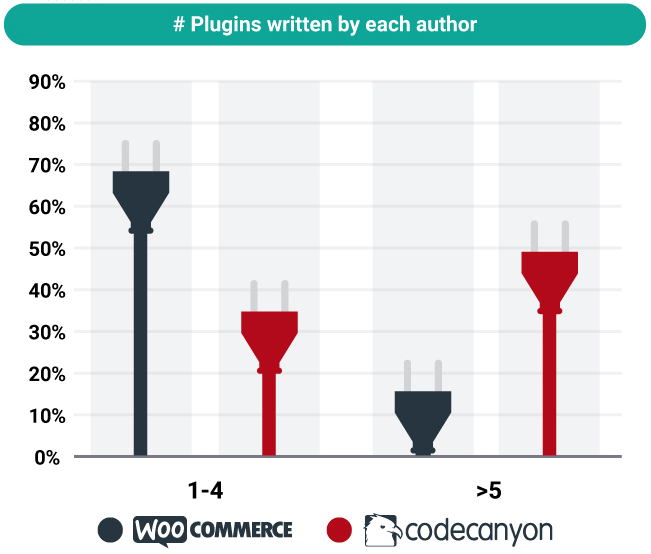Updated January 26th 2021
The State of WooCommerce Plugins in 2021
WooCommerce is an incredibly a popular e-commerce solution for building your online businesses. A major part of what makes WooCommerce so successful is how extensible and customizable it is. There are literally thousands of plugins available that let you add new features, functionality and tools with just a few clicks, and build exactly the e-commerce website you want. In this article we’ll explore the plugins available and dig into them.
Overview
WooCommerce is one of the fastest-growing e-commerce platforms currently being used by millions of websites. How many to be precise? Well, according to Builtwith, there are 3,876,748 WooCommerce websites in use today. Of the top 1 million websites in the world, about 7.6% are running WooCommerce. That’s quite impressive!
In the WordPress plugin repository, over 5 million active installations are reported, which can include development, testing and staging sites as well. But apparently millions of eCommerce store owners are currently using WooCommerce as the engine for their businesses.
Many bigger companies run their stores on their own servers and have full control over plugins and settings. But the best WooCommerce hosting providers allow even small businesses to take advantage of all its benefits. This lets them focus on the store front experience – rather than technical details.
In this article, we will explore and categorize the many plugins available for WooCommerce and perform some analysis to get an understanding of the current status of the ecosystem.
The Methodology
We choose to use the following two data sources for our analysis:
- The plugin repository in WordPress
- CodeCanyon – a popular marketplace for themes, extensions etc.
We chose these sources because, firstly, they are readily available data sources that contain some great information on the plugins. Secondly, they are the among the most popular sources and, we believe, representatives of the ecosystem in general. By looking at these sources, we believe we will be able to gain some insight into the state of WooCommerce extensions, and perhaps, uncover some interesting information on what is going on in the industry.
There are many plugins that are being distributed through alternative sites. For instance, on their own website. Such cases are not included in our analysis.
In addition though we did examine the WooCommerce official extension library. We found a total of 518 extensions across the following categories:
- Payments – 64 extensions
- Shipping – 62 extensions
- Marketing – 104 extensions
- Subscriptions – 39 extensions
- Enhancements – 183 extensions
- Store Management – extensions
The WordPress Repository
In the WordPress repository, there is no automated way to find all the plugins built for WooCommerce. So we followed some simple techniques to narrow our search and get the required results.
First, we manually searched for all the plugins with the tag ‘WooCommerce’. Next, we did a general search with the term ‘WooCommerce’. We then combined the results and removed the duplicates.
There are some plugins that are generic and cover both WordPress & WooCommerce that we did not include. For example, there are security solutions, backup plugins etc that are agnostic to WooCommerce but still help. In such instances, unless the author has either tagged the plugin appropriately or included WooCommerce in the title/description, they will not be included in our analysis.
From the WordPress repository, we were able to gather the following data points for each plugin:
- Author
- Title
- Number of active installations
- Rating
- Total number of ratings
- Tested WordPress versions
WordPress Active Installation Count
It should be noted that WordPress does not provide the exact number of active installations. Instead, it provides ‘buckets’. For example, a plugin might have an active installation number of 1000+. This indicates it has more than 1000 installations but less than the next threshold (which, in this case, is 2000+). The complete list of ‘buckets’ we found were:
| · 5,000,000
· 2,000,000 · 1,000,000 · 800,000 · 700,000 · 200,000 · 100,000 · 90,000 · 80,000 · 70,000 · 60,000 · 50,000 · 40,000 · 30,000 · 20,000 · 10,000 · 9,000 · 8,000 |
· 7,000
· 6,000 · 5,000 · 4,000 · 3,000 · 2,000 · 1,000 · 900 · 800 · 700 · 600 · 500 · 400 · 300 · 200 · 100 · 90 · 80 · 60 |
As you can see, there is a much finer granularity at the lower end. It is always possible there are other thresholds but there is not a plugin that is in that threshold. For example, there could be a 500,000 threshold.
CodeCanyon Marketplace
At CodeCanyon, they provide a category just for WooCommerce, which made it much simpler for us to identify all the WooCommerce plugins.
https://codecanyon.net/category/wordpress/ecommerce/woocommerce
We assume most of the plugin authors would have placed their plugins in the appropriate categories. So we simply looked at all the plugins here for our study.
Looking at the site, we were able to retrieve the following data points:
- Title
- Price
- Number of sales
- Last updated instance
- Author
- Category – this is defined by CodeCanyon
- Rating
- Number of ratings
Augmenting Data
We also decided to add some of our data that would help with the analysis.
Firstly, we categorized the top 250 plugins – ranked by the number of active installations in the WordPress repository and the sales in CodeCanyon. We assigned each plugin to one of the following categories:
- Extra Functionality
- Marketing
- Store Operations
- Payments
- SEO
- Shipping
- Speed and Security
It was more art than science! We created these categories and assigned the plugins based on our judgement – it might not be perfect, but directionally correct – the categories we used will certainly help us in our analysis. We did take a look at the categories CodeCanyon provides. However, we decided they were not an exact fit for our analysis and hence decided to go with our own categories, not too far from the CodeCanyon categories though!
We observed the ‘Extra functionality’ category was fairly broad, which had a scope for sub-categories. But then, we felt the current categories were adequate for our purpose.
How Many WooCommerce Plugins Are There?
So, what did we find as we arrived at these crazy spreadsheets? We found 3198 unique WooCommerce plugins and divided them into two:
- 1398 WooCommerce plugins in the WordPress repository
- 1800 CodeCanyon plugins

This looks interesting because, CodeCanyon has more plugins than the WordPress repository. Perhaps, it points to the fact that CodeCanyon has 100% paid plugins while the WordPress repository is a 100% free source (although many plugins have premium versions).
For WordPress, we arrived at the following statistics:

For CodeCanyon, we arrived at the following statistics:

Both the sources had some differences, but were quite similar. The leader, by far, was “Extra Functionality” category. It ain’t surprising! This category includes all features that the store owners want, but are not included in the stock WooCommerce setup.
Interestingly, there was very little in both the sources for SEO – this is an area that seems to be dominated by just a couple of players.
In the WordPress repository, we have the “Yoast SEO” plugin leading with 5 million+ active installations (which includes installations on the standard WordPress sites as well). This is followed by the “All in One SEO Pack” plugin with 2 million+ active installations (again including the WordPress installations). In the third place, with 100K+ installations is “SEOPress”.
In CodeCanyon, we found only one SEO plugin which comes in at 196th place, as ranked by sales – WooCommerce SEO.
Popularity/Installations/Sales of the Plugins
Next, we wanted to look at how popular the plugins were. Did a few plugins dominate? What does the distribution look like?
One of the metrics that is provided by WordPress is the ‘Active Installation’ bucket that we covered earlier. This is not a perfect measure, but certainly is directionally correct! On the CodeCanyon front, we have the number of sales which seems to be accurate.
So what did we see in these statistics?
As you can see in the following graph, the VAST majority of plugins have very few active installations. About 50% of the plugins we analyzed had less than 2000 installations and about 85% had less than 10,000 installations. You can see the spikes where there is a change in the jump between buckets.

For example: At 1000, this bucket represents from 1000 – 2000 installations. The previous bucket 900 represents 900 -1000 installations, so it is one-tenth the size of the next bucket. We see the same statistics at 10,000 installations as well. So, in general, we are not seeing super high installation bases. One reason could be many premium plugins actually disable the free versions in the WordPress repository and install a new one, reducing the number of installations.
In CodeCanyon we saw the following sales:

The highest number of sales recorded was almost 30,000. This had a list price of $49. So, excluding any promotional sales or cheaper prior prices, the gross revenue generated was almost $1.5 Million. Not bad! Yet there are very few plugins that get close to this kind of revenue.
About 90% of the plugins on CodeCanyon have made less than 1000 sales. At around $40-$50 per sale, the revenue comes up to tens of thousands of dollars. Making six figures of revenue from CodeCanyon seems like a target that just a small percentage of plugin authors achieve – at least just using the information we have gleaned.
Looking at the Authors
Further, we proceeded our study by looking at the authors. The first thing we considered examining was the “Author count”. In the WordPress repository, we found 885 authors and in CodeCanyon, 569 authors. This averages to 1.58 plugins per author in WordPress and about 3.16 plugins per author in CodeCanyon.
Wow! CodeCanyon authors seem to produce twice as many plugins as WordPress authors do!
Now, we wanted to dig into these numbers a little more!
Looking at WordPress, we discovered that about 50% of the authors had created just one plugin. In fact, we found 77% of all the WooCommerce plugins on the WordPress repository were created by authors with four or fewer plugins. It seems, in the WordPress repository, authors are not pumping a huge number of plugins.
The CodeCanyon results were a little different! Firstly, only 306 authors had created just one plugin. This is about 17% of all the plugins in the store. Compare this with the results of the WordPress repository where almost 50% of the plugins were written by authors with just one plugin. It’s quite a contrast!

Another interesting statistic we noticed was that 57% of the CodeCanyon plugins came from authors who had 5 or more plugins in the store versus 23% plugins in the repository. This indicates that the majority of CodeCanyon authors are writing 5 or more plugins. This could mean several things.
One factor that springs to our mind is around economics. The WordPress repository is firmly based on Community and Open Source. There is clearly economic intent from some authors, but there could also be a community aspect to it. Additionally, there are plugins where the economic upside is not in the plugin – Facebook for instance – so they ‘give away’ the plugin and monetize in some other way.
CodeCanyon, by contrast, is typically 100% focused on generating revenue through the plugin sales. This appears to be beneficial because majority of authors are coming back with additional plugins. It would seem reasonable that they would make efforts for the second, third, fourth plugin etc. provided they prove to be profitable.
Looking at the upper extremes was also interesting. The largest number of plugins we found published under one author was 48 in the WordPress repository – this was from the crew at YITH. By contrast, on CodeCanyon, we saw 63 plugins from an author called webkul.
YITH is very much a commercial interest, so it would seem the WordPress approach is a profitable venture given their large amounts of plugins. This would also seem to indicate that both venues offer good economics for authors to keep coming back and create more plugins. However, CodeCanyon seems to generate more authors who are willing to build more plugins.
Conclusion
What can we conclude from all of this analysis? Well, few things seem to jump out.
Firstly, there are thousands of plugins that allow you to extend and customize your WooCommerce store. They cover an ENORMOUS range in terms of functionality. This make WooCommerce extremely powerful, and arguably, is one of the key components of it’s success.
It seems the economic intent alters the behavior of the developers writing plugins. CodeCanyon authors seem to have different behaviors from the WordPress repository authors, as evidenced by the number of plugins they create.
We also know there are MANY plugins that are not distributed on either of the data sources we used, so it is difficult to get a true feel for the size of this market.
All in all the WooCommerce ecosystem is a vibrant place with a lot of activity that we hope will continue to drive WooCommerce forward and growing!
Here is all that information in one, fun, easy-to-view infographic!



